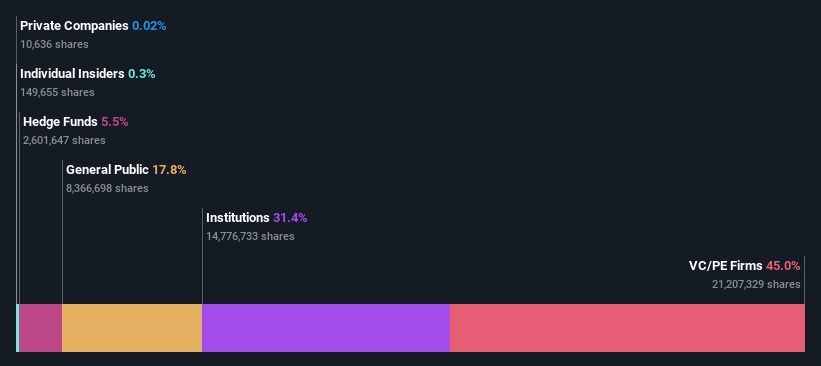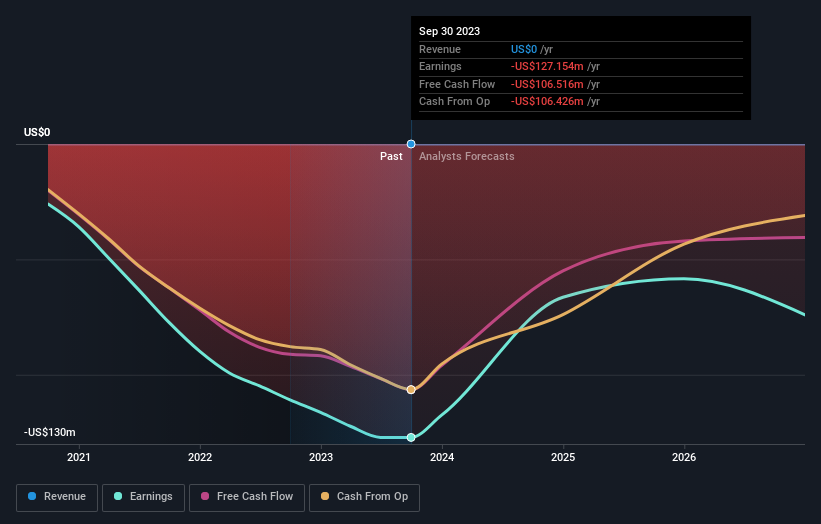Private equity firms who hold 45% of Kinnate Biopharma Inc. (NASDAQ:KNTE) gained 11%, institutions profited as well
Key Insights
The considerable ownership by private equity firms in Kinnate Biopharma indicates that they collectively have a greater say in management and business strategy
A total of 3 investors have a majority stake in the company with 51% ownership
To get a sense of who is truly in control of Kinnate Biopharma Inc. (NASDAQ:KNTE), it is important to understand the ownership structure of the business. We can see that private equity firms own the lion's share in the company with 45% ownership. Put another way, the group faces the maximum upside potential (or downside risk).
Following a 11% increase in the stock price last week, private equity firms profited the most, but institutions who own 31% stock also stood to gain from the increase.
In the chart below, we zoom in on the different ownership groups of Kinnate Biopharma.
Check out our latest analysis for Kinnate Biopharma
What Does The Institutional Ownership Tell Us About Kinnate Biopharma?
Many institutions measure their performance against an index that approximates the local market. So they usually pay more attention to companies that are included in major indices.
Kinnate Biopharma already has institutions on the share registry. Indeed, they own a respectable stake in the company. This implies the analysts working for those institutions have looked at the stock and they like it. But just like anyone else, they could be wrong. When multiple institutions own a stock, there's always a risk that they are in a 'crowded trade'. When such a trade goes wrong, multiple parties may compete to sell stock fast. This risk is higher in a company without a history of growth. You can see Kinnate Biopharma's historic earnings and revenue below, but keep in mind there's always more to the story.
It looks like hedge funds own 5.5% of Kinnate Biopharma shares. That catches my attention because hedge funds sometimes try to influence management, or bring about changes that will create near term value for shareholders. Looking at our data, we can see that the largest shareholder is Foresite Capital Management, LLC with 28% of shares outstanding. With 17% and 5.5% of the shares outstanding respectively, OrbiMed Advisors LLC and Tang Capital Management, LLC are the second and third largest shareholders.
After doing some more digging, we found that the top 3 shareholders collectively control more than half of the company's shares, implying that they have considerable power to influence the company's decisions.
While studying institutional ownership for a company can add value to your research, it is also a good practice to research analyst recommendations to get a deeper understand of a stock's expected performance. There are plenty of analysts covering the stock, so it might be worth seeing what they are forecasting, too.
Insider Ownership Of Kinnate Biopharma
The definition of company insiders can be subjective and does vary between jurisdictions. Our data reflects individual insiders, capturing board members at the very least. Management ultimately answers to the board. However, it is not uncommon for managers to be executive board members, especially if they are a founder or the CEO.
I generally consider insider ownership to be a good thing. However, on some occasions it makes it more difficult for other shareholders to hold the board accountable for decisions.
Our information suggests that Kinnate Biopharma Inc. insiders own under 1% of the company. It appears that the board holds about US$340k worth of stock. This compares to a market capitalization of US$107m. Many tend to prefer to see a board with bigger shareholdings. A good next step might be to take a look at this free summary of insider buying and selling.
General Public Ownership
The general public-- including retail investors -- own 18% stake in the company, and hence can't easily be ignored. While this group can't necessarily call the shots, it can certainly have a real influence on how the company is run.
Private Equity Ownership
With a stake of 45%, private equity firms could influence the Kinnate Biopharma board. Some investors might be encouraged by this, since private equity are sometimes able to encourage strategies that help the market see the value in the company. Alternatively, those holders might be exiting the investment after taking it public.
Next Steps:
I find it very interesting to look at who exactly owns a company. But to truly gain insight, we need to consider other information, too. Be aware that Kinnate Biopharma is showing 3 warning signs in our investment analysis , and 1 of those makes us a bit uncomfortable...
If you are like me, you may want to think about whether this company will grow or shrink. Luckily, you can check this free report showing analyst forecasts for its future.
NB: Figures in this article are calculated using data from the last twelve months, which refer to the 12-month period ending on the last date of the month the financial statement is dated. This may not be consistent with full year annual report figures.
Have feedback on this article? Concerned about the content? Get in touch with us directly. Alternatively, email editorial-team (at) simplywallst.com.
This article by Simply Wall St is general in nature. We provide commentary based on historical data and analyst forecasts only using an unbiased methodology and our articles are not intended to be financial advice. It does not constitute a recommendation to buy or sell any stock, and does not take account of your objectives, or your financial situation. We aim to bring you long-term focused analysis driven by fundamental data. Note that our analysis may not factor in the latest price-sensitive company announcements or qualitative material. Simply Wall St has no position in any stocks mentioned.


